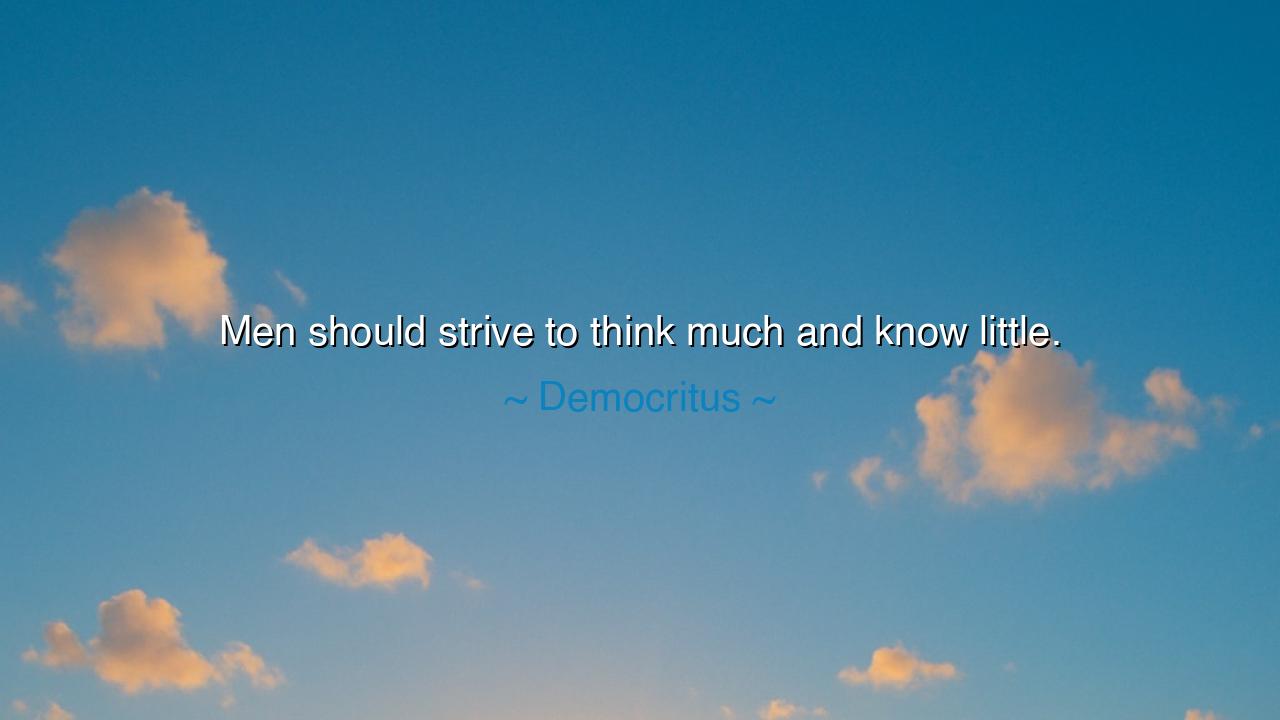
Men should strive to think much and know little.






The words of Democritus, “Men should strive to think much and know little,” echo across the centuries like the murmur of a sage who has seen the vanity of human pride. This ancient philosopher, born among the early thinkers of Greece, was a man who peered into the invisible—who saw that the universe itself was made of tiny atoms, unseen but eternal. His wisdom here does not scorn knowledge, but warns against knowledge without contemplation, against the arrogance of collecting facts while neglecting the art of understanding. To think much is to search deeply, to question, to wonder, to meditate on meaning. To know little is to remember that all knowledge is small beside the infinite mystery of truth.
In every age, there are men who boast of what they know. They fill their minds with data, their tongues with recitations, and their hearts with pride. Yet their knowledge is like a river without depth—wide, but shallow. Democritus, who was called the “Laughing Philosopher,” laughed not at others’ folly but at mankind’s obsession with surface wisdom. He saw that wisdom begins where certainty ends, that it is not the abundance of facts but the humility of inquiry that awakens the spirit. To think much is to stand before the unknown and ask, “Why?”—to turn the eye inward, to question one’s own mind, to seek not possession of truth but union with it.
In the story of Socrates, we find a living reflection of Democritus’s teaching. When the oracle at Delphi declared Socrates the wisest of all men, he did not rejoice—he doubted. He walked among the citizens of Athens and discovered that those who claimed to know much were the most ignorant, while he, who admitted to knowing nothing, was the closest to truth. “I know that I know nothing,” he said, not as an excuse for ignorance but as the ultimate recognition of wisdom’s humility. This is the essence of Democritus’s words: that the wise man thinks deeply, but claims little. He drinks from the well of thought, not to fill himself with pride, but to cleanse his vision.
To think much and know little is to live in harmony with mystery. It is to recognize that the universe is vast and the human mind, though wondrous, is but a flickering flame in an endless night. The thinkers of the ancient world understood that too much confidence in knowledge leads to stagnation, while reverence for uncertainty gives birth to discovery. Democritus himself, in his study of the cosmos, did not pretend to master it. He gazed into the unseen atoms and saw in their ceaseless motion the humility of existence itself: everything moves, everything changes, and only the seeker who keeps thinking can glimpse truth before it shifts again.
Consider the story of Isaac Newton, centuries later—a man who, after uncovering the laws of gravity and motion, stood by the sea and said, “I do not know what I may appear to the world, but to myself I seem to have been only like a boy playing on the seashore... finding a smoother pebble or a prettier shell, while the great ocean of truth lay all undiscovered before me.” Newton, like Democritus, understood that to know little is the beginning of knowing greatly. His thinking was infinite, his humility profound. He thought much, but he never claimed to have grasped the whole.
Democritus’s teaching also speaks to the age in which we live now—a world overflowing with information but starving for thought. Men and women today know much and think little; they carry libraries in their pockets, yet cannot find wisdom in their souls. They seek instant answers instead of enduring questions. Thus the philosopher’s words call us back to an older rhythm of the mind: to slow the race of knowledge and deepen the silence of reflection. For in that stillness, the spark of understanding begins to glow.
So let this wisdom be preserved: Do not chase the illusion of knowing everything; instead, cultivate the strength to think deeply about what little you know. Read, but reflect. Learn, but doubt. Speak, but listen to the echo of silence that follows your words. For truth is not the possession of the learned, but the companion of the humble. As Democritus teaches, a man who thinks much and knows little is not poor in knowledge—he is rich in wisdom. And in that richness lies the peace of one who understands the most sacred truth of all: that to wonder is greater than to know.






AAdministratorAdministrator
Welcome, honored guests. Please leave a comment, we will respond soon